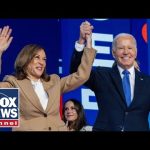In Los Angeles, Vice President Kamala Harris recently unveiled her new economic plan, aiming to win back a critical voting bloc: Black men. This move comes as her campaign faces significant challenges, with recent polls indicating a decline in support from this demographic. With former President Trump closing the gap, Harris is doubling down on her efforts, hoping to build what she describes as an “opportunity economy.” This plan includes promises of student loan relief, regulatory frameworks for cryptocurrency, and a health equity initiative. Additionally, Harris has highlighted her plan to legalize recreational marijuana, arguing that it could open doors for Black Americans in a growing industry.
Critics, however, are skeptical. Michael Whatley, chair of the Republican National Committee, expressed concerns about the $2.5 trillion in inflationary spending during the Biden-Harris administration. He argued that this spending has contributed to rising prices for essentials, leaving many voters, including Black Americans, reconsidering their political loyalties. With soaring gas prices and expensive groceries, dissatisfaction is growing in various communities.
Whatley also took issue with Harris’s economic agenda, calling it a last-minute attempt to fix problems her administration helped create. While Harris has proposed loan forgiveness of up to $20,000, many are questioning the authenticity and timing of these promises. Additionally, her intention to let the Trump-era tax cuts expire and introduce higher taxes has sparked concerns about whether her policies will truly foster economic growth.
Moreover, some critics argue that Harris’s strategy may lack substance. While her proposals sound appealing, they claim that her past policies suggest little will change. Voters, they say, are growing weary of political promises that don’t translate into action.
In contrast, Trump’s campaign appears to be gaining momentum. He leads in several battleground states, and his campaign events have drawn considerable attention. While Harris is working hard to defend her policies, Trump is actively engaging voters. With the election drawing closer, it remains to be seen whether Harris’s plans will be enough to sway undecided voters.
As Harris continues to promote her “opportunity economy,” she faces increasing pressure to demonstrate tangible leadership, not just make promises. Voters will soon decide whether her proposals are the key to their future or if they are simply campaign rhetoric. For Kamala Harris, the clock is ticking, and the stakes are high.




